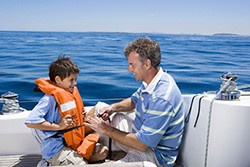 Waterskiing, wakeboarding, tubing, fishing, or a relaxing ride - summer is the perfect time to explore the water. But a sunny summer often leads to a rise in boat traffic, which can result in unpleasant outcomes for the uninsured and unprepared sailor.
Waterskiing, wakeboarding, tubing, fishing, or a relaxing ride - summer is the perfect time to explore the water. But a sunny summer often leads to a rise in boat traffic, which can result in unpleasant outcomes for the uninsured and unprepared sailor.
A Coast Guard report states that over $42 million dollars of damage to property occurred due to recreational boating accidents in 2014, with a 2.3% increase in accidents since the prior year.
Do you have the proper insurance in place to protect you in case of an accident? Are you following safety precautions to prevent incidents and injuries? Here are 8 tips to help you sail safely this summer:
1. Obtain Proper Insurance
Even the most prepared and careful sailor can run into issues. Purchasing a boat is a substantial investment. Protecting it, and your passengers, should be a priority. There is always the risk of unanticipated accidents, and the forward-thinking captain should consider investing in a good boat insurance policy.
Just like car insurance, a good boat insurance policy will protect your finances should your boat be damaged, reducing your personal risk. It will also protect you against damage or injury you cause to other parties. Typically, any boat that is 26 feet or less can be covered under boat insurance. If you own a larger vessel, it may need to be covered under a "yacht" insurance policy. Keep in mind that most building insurance or homeowner policies do not cover boats, so a separate boat insurance policy is essential.
However, boat insurance is not generally mandated by law, so you may be sailing alongside boaters with no coverage. To help manage this risk, consider uninsured boater coverage. If a boat with no coverage causes injuries to a covered person, uninsured boater coverage can help provide protection and compensation. The policy contract varies, but most companies have a separate policy (hull coverage) to compensate for property damage to your boat. Uninsured boater coverage is very valuable. Talk to your insurance advisor to learn more and discuss adding it to your policy.
2. Learn To Swim
In fatal boating accidents, 76% of victims drowned. For the everyday sailor, it is incredibly important that your passengers either can swim or wear the proper flotation gear in case of an accident. If possible, encourage your passengers to enroll in swimming lessons at local fitness clubs or through the American Red Cross.
3. Utilize Safety Equipment
Similarly, having properly fitting life-vests and safety equipment can help reduce your risk of injury and death when enjoying time on the water. The minimal equipment needed for a boat less than 26 feet is the following: fire extinguisher, visual distress signal, a bell or whistle, backfire flame control, ventilation, and vessel lighting.
4. Use Common Sense
Common sense, such as not operating your boat under the influence of alcohol or drugs, can go a long way in preventing accidents or injury. Maintaining safe speeds and distances will also ensure that you are doing your part to protect your property and passengers.
5. Know The Weather
Knowing weather forecasts and predictions, as well as your vessel limitations, can help ensure that you and your passengers travel safely. Sailing when there are dark or threatening clouds should be avoided when possible.
6. File A Float Plan
Before departing, telling a marina staff member or a family member of your estimated departure and arrival time will help ensure that someone will know if there is a mishap in your journey. A basic float plan includes your name, address, phone number, boat registration, equipment onboard, and itinerary information.
7. Create Pre-Departure Checklists
A pre-departure checklist is a great way to ensure you have all the necessary equipment on board for a safe journey. Proper fire and floatation equipment, as well as area-specific regulations, should be checked before leaving the dock.
8. Participate In Training Courses
Proper training on current maritime law can help you stay current on boater education. Many states offer community college courses or online tutorials to stay current with boating safety.
Following these tips can go a long way to reducing the chance of harm on your next boating adventure. But even with preparation, not all accidents can be avoided. Talk with your insurance advisor to make sure you have proper coverage to protect you, your passengers, and your watercraft.




